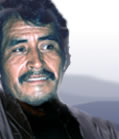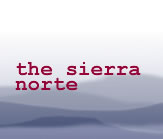 |
 |
||
 |
|||
|
RELATED THEMES identity spiritual beliefs OTHER LOCAL THEMES BACKGROUND |
festivals
In many villages and towns in Oaxaca there is a tradition of local festivals. One narrator from Ixtlán (Mexico 15) goes through the community festival calendar: "Well, el dia de reyes (Epiphany) is on the 6th of January. After that, it's one that has been lost - baile de los compadres (dance of the companions) - which used to be held on the 6th of February. After that is .Holy Week. After that is the festival of the area of San Pedro which is on the 29th of June, this is one of the first festivals of the community.. on the 15th of August we celebrate the region of Asunción, on the 15th of September, 16th of September we celebrate the independence of our Fatherland and the Gritade Dolores (the call for independence made by the town of Dolores, Hidalgo). The 14th of October is the area of San Francisco and then there's the 1st of November when we celebrate the fiesta de muertos (Day of the Dead) - Todosantos (All Saints Day) - when everyone prepares food and fruit and everything for the deceased. Then there is the village festival which is the most important for us, but before that there's the festival on the 18th of December which is Soledad (fiesta of the Virgin of Soledad, patron saint of Oaxaca) and then it's the 21st which is the village festival. After that Christmas is on the 24th and 25th." Easter is the biggest Catholic celebration, more important in Mexico than Christmas: "[Holy Week] .isn't really a festival, but [time to reflect on] what happened to our Lord Jesus Christ more than anything, everything that he suffered.they are days to reflect on [this] and days for being with one's family.everybody who is from here but is in Mexico City or Oaxaca City comes; others come from the United States" (Mexico 15). The Day of the Dead, at the beginning of November, is a major festival of pre-Hispanic origin where people remember deceased family members, and the continuity of life. It is celebrated on the same day as the Catholic festival of All Saints (Todosantos): ".soon it will be . All Saints Day. They used to say that the dead came back [on this day]. the first day of November. The whole community kills chickens and makes tamales (traditional ground maize with various fillings, wrapped in banana or corn leaves) and they put bottles of mezcal (traditional alcoholic drink made from maguey, the agave) on the table, they put out bread and fruit, and make decorations in the shape of an altar where the table is prepared" (Mexico 2). Traditionally, dancing occupied a central place in festivals, although this seems to be in decline, as one narrator (Mexico 5) notes: "Well, it's because there aren't young people who want to take part and there's no teacher to teach the dances. That's why there won't be any. [When] there are the traditional dances.the festival is more fun.". Another narrator (Mexico 6), while laying some of the blame for the decline of the festival tradition on the rise of Evangelical religion, also laments the fact that people are less prepared to invest in these community celebrations: "We all had to buy our own clothes for the dance. [Now] they are afraid to ask their parents, because of the expense of the sandals and the fabric, to make trousers for the men and skirts in the case of the women.it costs a lot of money. I think that's [also] why they don't take part any more. before there was more commitment, because before we gave food to everyone who came, unlike now when they just attend to those they know." Her view is shared by another member of the same community (Mexico 2): ".now, when there is a festival they forget to do the procession with the church statues. The topiles (those holding a junior community position, involving running errands and keeping order) don't bring a canopy to give shade for the statues.". Yet at least one young man (Mexico 5) appreciates the fact that festivals are occasions for good food and drink: ".at the festivals...there are the traditional dances and then we eat if we're hungry, one has to visit people and they give you food. they give us, more than anything they give us mezcal (traditional alcoholic drink made from maguey), chingre (alcoholic drink made from fermented sugarcane), and tepache (traditional alcoholic drink)." He goes on to describe a traditional dance - the Guanchinene - in which he used to take part. quotes about festivals"The traditions that our forefathers had were very nice, and everything was well organised...they celebrated four festivals a year.they appointed a mayordomo (responsible for arranging community festivals; a cargo position) who is in charge of buying the candles to burn in the church. On the day of the festival the fiscales (those responsible for certain church activities) are in charge of lighting the candles. The mayordomo has the duty of visiting the musicians. the fiscals. light the candles and look after them so that they burn well, and also they have to sweep [the church] and change the flowers." ".some villages, yes they do have good festivals. I'm not saying that they're the same; every village has it's traditions that have always been, one can't have a festival like they do in Yagila, like they do in Josaá - they're done...like they've always been done" "When there is a religious festival, people come from other communities. What they do is give out alcohol - they say it's 'el respeto de uno' (good hospitality) - and that's how the kids start drinking. Even women drink mezcal and chingre (traditional alcoholic drinks made from maguey and fermented sugar cane respectively)." "These traditions [have] become lost, because of the [other] religion that has arrived here.Well there are more Evangelicals now, people were together before; there weren't any [different religious] groups. for us Catholics, it's bad that we are losing the traditions, but for the Evangelicals, well.it suits them that all the traditions of a festival are lost." "There's no spirit, they don't get together for entertainment now. There are some that say.[our traditional culture] won't help us. Well, it's not a matter of it helping us but of the enjoyment. I organised two, three dance classes. A music teacher came here. He taught us the Mixe dance and . the Tehuana. I was also with the band and practised the son (chorus) of the dance. Just imagine, my friend, I was in the band for 25 years, I played the trumpet. I can [also] play the flute but I gave it up.because I didn't have anyone to play with." |
|